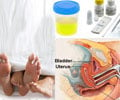Australian researchers have geared up efforts towards the development of the world’s first vaccine for chlamydia by starting new tests on animal models.
Australian researchers have geared up efforts towards the development of the world’s first vaccine for chlamydia, the most common sexually transmitted infection, by starting new tests on animal models to determine how the body’s immune system responds to the disease.
Collaborators from Queensland University of Technology and Harvard Medical School will genetically engineer mice, and direct their immune-fighting cells, known as T-cells, specifically to protect against the mouse strains of chlamydia."In doing this we will be able to learn things about what is involved in protecting mice against chlamydia infection and then mimic those responses with vaccines," News.com.au quoted Dr Michael Starnbach, a Harvard researcher who is in Australia to carry out the work, as saying.
"Ultimately, the idea is to understand enough about how chlamydia interacts with cells and how the immune system responds to those infected cells, to be able to understand which components of the immune system need to be stimulated to fight the chlamydia infection," he added.
The researchers have also revealed that they may begin testing the vaccine on women within three years.
"There are antibiotics to treat chlamydia, but there's no vaccine to prevent it," said Professor Peter Timms, who is jointly heading the Australian arm of the research.
"In many cases, women don't know they are infected because there are not really any physical signs or symptoms, so by and large they don't get treatment," he added.
Source-ANI
GAN/V









